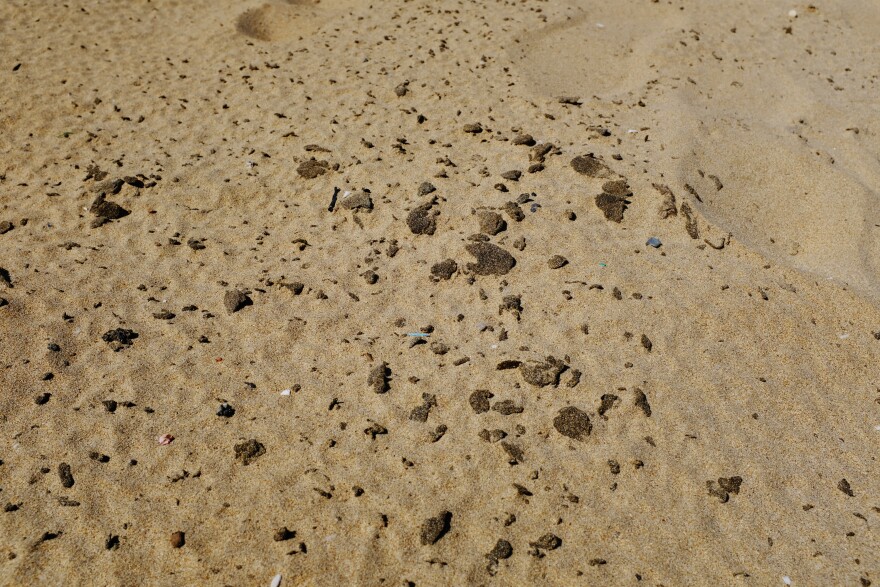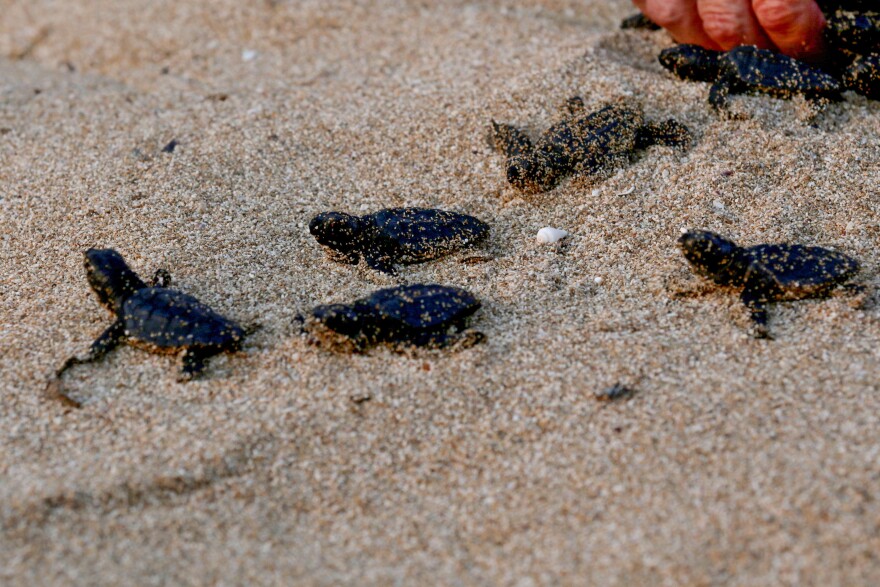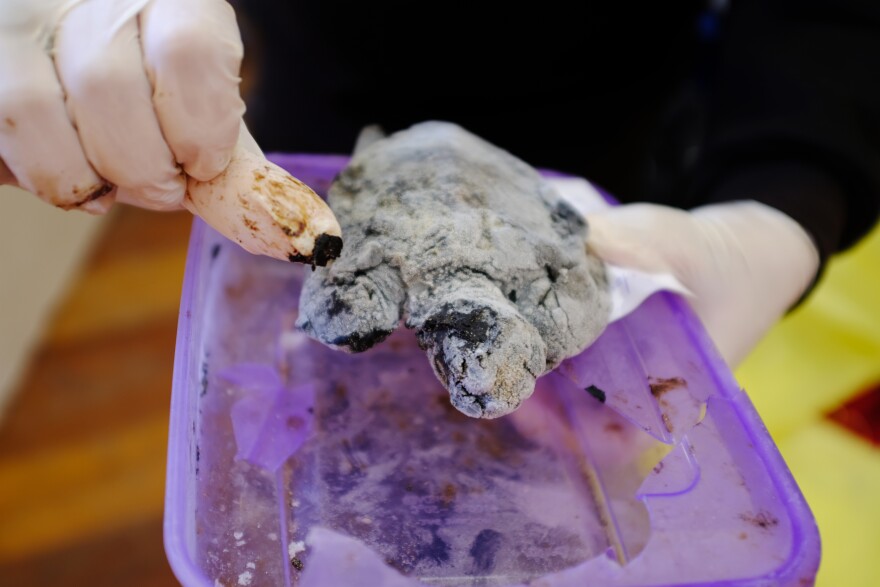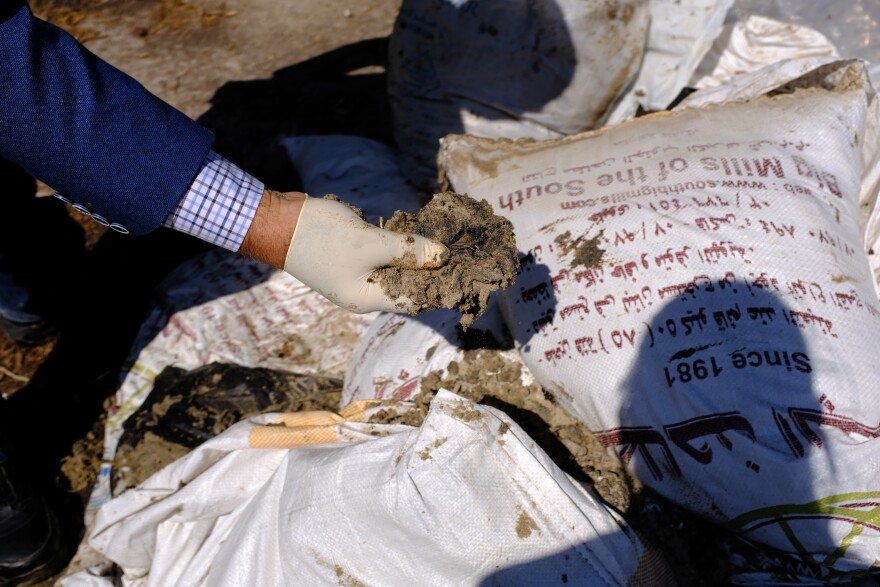TYRE COAST NATURE RESERVE, Lebanon — An oil spill in the eastern Mediterranean Sea last month has polluted Lebanon's coastline, damaging beaches that are nesting grounds for endangered green turtles and vulnerable loggerhead sea turtles.
In southern Lebanon, some of the country's last beaches spared from factories and tourist development are now carpeted in globs of poisonous tar. As weeks pass, the soft black pieces fragment into smaller particles that sink deeper into the sand.

"It's too terrible. When the turtles come here to breed, they choose their nesting area very carefully," says Fatima Jaafar, a science teacher and volunteer with the environmental group Green Southerners, who every year helps to clean and ready these protected beaches for the nesting season. "If they sense any danger, they may change their minds and leave the beach."
The suspected leak from an oil tanker in the eastern Mediterranean Sea caused an estimated 1,000 tons of sticky black tar to wash up on Israel's shores in early February. The oil slick quickly spread and eventually reached the coasts of neighboring Lebanon. Marine experts say the spill has damaged nature reserves in the south of the country, the beaches near the capital of Beirut and even further up the coast.
Many of the affected beaches in southern Lebanon are protected habitats for the turtles. Ali Badreddine, a marine biologist who works in turtle conservation projects in the country, says the pollution is dangerous for the nesting turtles — particularly for female turtles who use their flippers to dig their nests. He fears the oil pollution can impede this process, and may also be toxic for the hatching offspring. The potential damage to the nesting season — which starts in earnest in May — will depend on how quickly the beaches can be cleaned, he says.
If the tar isn't removed "with accuracy and efficiency," says Badreddine, "we will have a disaster, a big catastrophe."

The oil spill has already claimed victims. Hassan Hamze, the deputy director of the Tyre nature reserve in southern Lebanon, opens a freezer in a backroom of the reserve's office and pulls out the corpse of an endangered green sea turtle. Its small frozen body is covered in black congealed oil.
Inside the freezer there is also the corpse of a 3-foot-long loggerhead turtle. Hamze says his team at the reserve is waiting for an autopsy to determine its cause of death. Environmental activists and volunteers say they found the bodies of at least four other turtles since the oil slick reached Lebanon's shores in February.
In neighboring Israel, the oil spill has been declared the biggest ecological disaster in years, with tar damaging more than 90% of the coast. The Israeli government has allocated millions of dollars for the clean-up effort and sent its military to help thousands of volunteers scrub the beaches and take stock of the effects on marine life. A 55-foot fin whale was among the many creatures found dead in the aftermath.

A hampered response
In Lebanon, where the oil spill comes after a year of myriad crises, the government has been unable to organize anything resembling a similar response. It has commissioned a study of the damage caused by the spill and called for international assistance. Hassan Dbouk, the mayor of Tyre, says he traveled to Beirut after the spill to meet with government ministers and discuss a strategy for the clean-up, but came away with little material support.
"They don't have money," Dbouk says, referencing the devastating economic conditions consuming the country. A currency collapse has cost people across Lebanon to lose most of the value of their salaries. There are now near daily protests against the endemic corruption and mismanagement that has driven the country to this situation.
Angry crowds of desperate protestors have tried to tear down the security barriers around parliament and regularly block highways with burning tires. Some politicians are now so unpopular in Lebanon, they have been chased down the street and out of stores. Many now avoid being seen in public.
"They have other priorities," Dbouk says of the government with a sad shrug.

It remains unclear who is responsible for the spill, though some in the Lebanese government have sought to leverage it for political gain by blaming the disaster on "an Israeli entity." Israel and Lebanon have a history of conflict, and remain in an, albeit quieted and stalemated, state of war.
For its part, Israel his linked Iran — its regional nemesis — to the spill, saying it was caused by a tanker that was carrying pirated cargo from Iran to Syria. The Israeli environmental protection ministry says it has strong "circumstantial evidence" to support this claim, though it has acknowledged it lacks any "forensic evidence."
"It's a disaster actually"
Back on the beaches in southern Lebanon and far from the investigations and political blame games, volunteers have come from all over the country to try to rescue beaches that mean so much to so many.
The tar sticks to the shoes of Ranim Tahhan, a 21-year-old marine biology student, as she walks on the long sand beach in Tyre. It stains the medical gloves she wears with streaks of oily black as she picks the lumps out of the sand.
"Lebanon has these amazing places for turtle nesting, and they are so important for us because these turtles are endangered. It's very sad that this put them in in danger when they are already endangered," she says. "It's a disaster actually."
Tahhan and the other volunteers use hand held circular sieves to scoop up the sand and shake it out to remove lumps of tar. It's slow, painstaking work. This beach alone is two-and-half miles long, and the waves have thrown the tar far up the beach. A study by the country's National Council for Scientific Research estimates there are almost 2 metric tons of tar on this beach alone.
Dbouk, the mayor of Tyre, says despite everyone's best efforts, he believes volunteers will only be able to clean "10 or 20%" of the pollution of the beaches in the region.
He says he is working with a local team make a home-grown mechanical contraption to help the beach.
"It will be like a big sieve; 200 by 100 meters," he says, explaining how the machine will vibrate to shake out the sand and collect the tar.

Even with machinery like this, Dbouk worries they may not be able to thoroughly clean the beach. He points to an area of the beach that has already been cleared. And there, in the sand, are tiny black flecks of oil.
With every day that passes, the bigger lumps of tar break down into small particles like these. They sink irretrievably into the sand, polluting this precious protected shoreline for years to come.
Copyright 2021 NPR. To see more, visit https://www.npr.org. 9(MDAxMTMyMDY2MDEyNDUxNzAyNjlmODI5NQ004))



